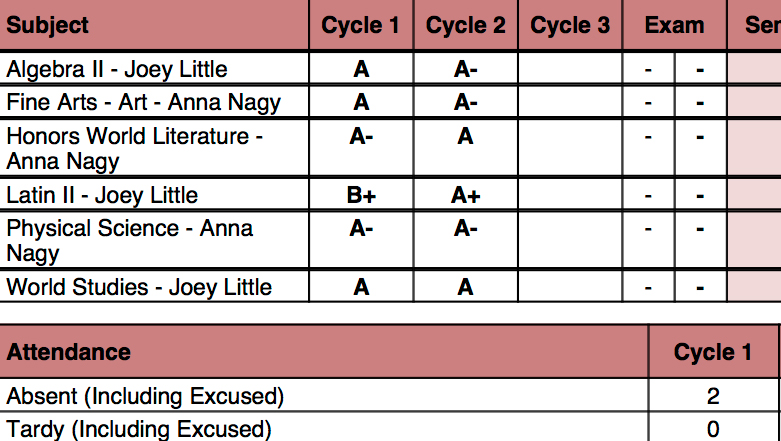Teachers Admit To Lying On Student Report Cards To Make Their Jobs Easier
An educator asked about the efficacy of lying on a report card. He or she is in a "panic" because perhaps they have been doing it wrong because a colleague does it all the time. An educator. Let that simmer a little while. I'm so done.

Dr. Teresa Sanders is calling out teachers across the country. Not all teachers, mind you, just the ones who don’t feel it necessary to be truthful on report cards.
Dr. Sanders is grabbing some attention with a Tweet she recently posted regarding teachers and lying on report cards. In her tweet, Dr. Sanders began by pointing out that an educator was questioning whether lying on a student report card was something he or she should be doing because their colleague does it all the time. Her tweet reads:
“An educator asked about the efficacy of lying on a report card. He or she is in a “panic” because perhaps they have been doing it wrong because a colleague does it all the time. An educator. Let that simmer a little while. I’m so done.”
Dr. Sanders then ended it with #canwepleaseteachthekidstoread.
What Dr. Sanders was responding to was another tweet in which this educator started by saying they were having a “personal panic moment” and then went on asking if “you”, as an educator, “lie” in the report card comments you write. The educator continued on by saying that the “lie” in question isn’t something worded nice or delicate, but an out-and-out lie where you intentionally mispresent the student’s work, ability, and/or behavior.
The educator then went on to give background to the question posed. The teacher said that they teach sixth grade and were having a conversation with their best friend, a fifth-grade teacher, who teaches at the same school. The sixth-grade teacher was having trouble on how to word comments for a student who was having a hard time grasping certain math concepts. When she was done explaining to her best friend, the fifth-grade teachers’ response was to “lie” about it.
The fifth-grade teacher went on to explain that she never tells the parents the truth. She never puts anything negative about a student in the comments section. She basically says that the student is “doing great in class and is a pleasure to work with” for all her students.
After hearing this, the sixth-grade teacher says they are in a “panic” wondering if they “missed the boat somewhere.” The teacher then asked if it was common practice to lie on the report card also wondering if they have been doing it wrong all these years. They ended their tweet by confessing they honestly, but kindly, document both the struggles and successes on their student’s report cards.
Apparently, according to some of the responses to Dr. Sanders’ tweet, teachers lying about their students is more commonplace than we may believe.
Most comments, though, fell in line with Dr. Sanders’ sentiments. Some comments obviously came from those in classrooms.
After seeing all the feedback and comments, Dr. Sanders once again pitched in with these comments on teachers lying: “But what’s also frightening is a grown-up somebody is questioning their own integrity because a colleague has none. Because errybody else is lying and cheating, maybe I should be too? Hoo boy. Girl, I’m done.”
Dr. Sanders earned her doctoral degree in Educational Leadership from the University of Phoenix. Today, she teaches privately in a small town in East Texas. Prior to that, she was an adjunct faculty member for 12 years at the University of Phoenix. education columns for four newspapers.
So, this begs the question: How often do public school teachers lie to parents about their children? Sadly, it may happen much more than you are aware. Andrew J. Coulson is the author of Market Education: The Unknown History and in it, he describes just how public schools deliberately lie to parents about the veracity of their children’s academic abilities.
“Consistently greeted by A’s and B’s on their children’s report cards, the parents of Zavala Elementary School had been lulled into complacency, believing that both the school and its students were performing well,” Coulson wrote. “In fact, Zavala was one of the worst schools in the district, and its students ranked near the bottom on statewide standardized tests. When a new principal took over the helm and requested that the statewide scores be read out at a PTA meeting, parents were dismayed by their children’s abysmal showing, and furious with teachers and school officials for misleading them with inflated grades.”
Janie Hall and Paul Kleine authored a report in the journal Educational Measurement: Issues and Practice in which they queried 2,256 public school teachers, principals, superintendents, and testing supervisors wanting to know if their colleagues cheated on tests (helped students). 44% answered yes to this question. 55% also offered that they were aware of fellow teachers who would change students’ answers, gave students hints during a test, and more. This report on teachers lying was conducted in 1992. It’s safe to assume that since then things have only gotten worse.
Are these things two of the same? On the whole, the answer would appear to be yes. Fudging report card comments only can exacerbate the underlying issue, which appears to continue as the student progresses throughout school. ious issues need to be rectified. How, is the question. For the future of our young minds, let’s hope honesty prevails instead of lying teachers.



